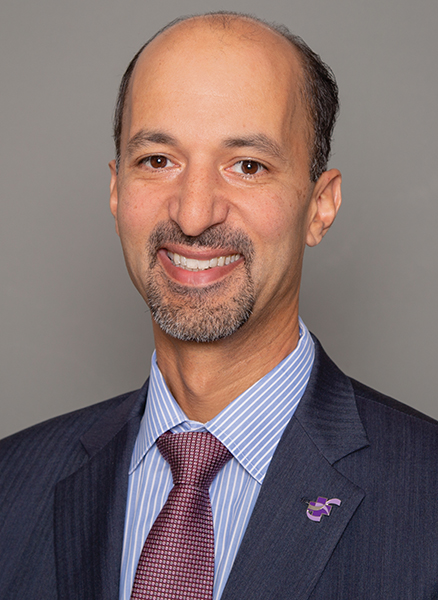An International Perspective
Q&A With Sam Bachi, M.D.
 Sam Bagchi, M.D., is chief medical officer and chief medical information officer at Irving, Texas-based CHRISTUS Health, where he supports physicians and other caregivers with the information and technology needed to promote patient safety and improve patient care. He spoke about the role of data in healthcare, CHRISTUS’ leadership development program and the lessons he’s learned from working across international boundaries.
Sam Bagchi, M.D., is chief medical officer and chief medical information officer at Irving, Texas-based CHRISTUS Health, where he supports physicians and other caregivers with the information and technology needed to promote patient safety and improve patient care. He spoke about the role of data in healthcare, CHRISTUS’ leadership development program and the lessons he’s learned from working across international boundaries.
What is your background, and what was your path to this position?
Bagchi: Before joining CHRISTUS, I served as chief medical officer and quality officer at Presence Health (now part of Ascension) in Chicago. Prior to serving in that role, I was senior vice president and chief medical officer of Methodist Health System in Dallas. However, I practiced hospital-based internal medicine for many years before I moved into these administrative roles. I became more interested in management and ultimately the chief medical officer role by working on a variety of projects related to process improvement and quality initiatives. Although I loved providing sequential care to patients, I’m excited about having a broader impact on many patients in their communities through these programs.
In a value-based care environment, more physicians are moving into traditional administrator roles in their facilities. What is your philosophy on engaging physicians to take on these roles?
Bagchi: Physician leaders have a distinct advantage because of their direct clinical experience and common understanding of clinical issues. They’re in a position to drive value-based care—the kind of care where you don’t just focus on expense reduction or growth for the sake of growth but on true value creation. I believe physician leaders will be able to drive the kind of healthcare outcomes we’ll need to see over the next 10 to 20 years.
At the same time, I don’t think every health system needs to be led by a physician. Many non-physician leaders have advantages on the finance and strategy side—they have the ability to present innovative ideas that may not germinate through traditional healthcare thinking. To drive the best possible outcomes, you need a good mix of leaders, whether they be physicians, nurses, MBAs or MHAs. It really comes down to the right candidate for the right role. Great leaders can be found in many other disciplines.
How does CHRISTUS prepare physicians to take on a hybrid role of physician administrator/physician executive?
Bagchi: CHRISTUS has many great opportunities for physicians who want to rise through the organization. For instance, our hospitals and medical groups are led by chief medical officers, while various specialties like surgery or acute care, are led by institute chairs. In addition, CHRISTUS has a whole cascade of medical directorships, including the areas of population health and clinical informatics.
There is also a formal program for developing the leadership skills of up-and-coming physicians across the enterprise. Two of the key competencies are business operations and conflict resolution.
We’re looking to strengthen the program by creating a physician-led faculty where physicians train rising physician leaders. As it stands now, the program relies on a lot of the same talent development support we use for our non-physician leaders. The program is also bolstered by identifying and including independent physicians with leadership promise who practice at CHRISTUS hospitals.
What does your role as chief medical information officer (CMIO) involve?
Bagchi: As a CMIO, I use clinical technology and healthcare technology to drive improvements in both quality and safety as well as better operations. I look at optimizing our electronic medical records (EMR) and other clinical technologies like voice recognition and clinical analytics to drive better outcomes. Along those lines, we’re looking to pilot ambient listening devices for clinical encounters.
In what ways is CHRISTUS harnessing data to help its facilities deliver excellent patient care?
Bagchi: Data is used to measure most of our care delivery processes. Advanced data governance ensures that the right information is aligned with the right issue. As an example, dashboards have been developed to support specialty care along with specific conditions like sepsis. We’re also looking at bringing analytics closer to the point of care by integrating process data into the physician workflow by embedding it in the EMR.
Our top-line initiatives are around providing quality care and high reliability while lowering clinical variation and waste wherever we can. We are doing that through clinical operations informatics work around EMR, clinical technology, virtual care, clinical analytics and case management.
How has CHRISTUS approached its operations in Latin America?
Bagchi: CHRISTUS has learned many important lessons in the more than 15 years of experience we have now in global health care. People often make assumptions about the healthcare experience in Latin America. The CHRISTUS health delivery model is designed to achieve high-quality outcomes for all we serve. To do this, we operate with similar standards in both the U.S. as well as Latin America. For example, we have implemented a high-reliability program across the entire system. We’ve shared important tools, leading to improved safety event reporting and subsequent harm reduction in all of our facilities including Latin America. We’ve also shared basic quality and safety initiatives like proper hand washing, and we’ve worked hard to eliminate conditions that could harm patients such as catheter-associated urinary tract infections or central line-associated bloodstream infections. Physician support content, including order sets for heart failure or acute MI and EMR implementation best practices have also been shared.
How are the challenges different in Latin America as opposed to the United States?
Bagchi: There is less regulation in Latin America, so innovation moves faster. On the other hand, we don’t have EMRs fully deployed in this region, so there are barriers to automating clinical practices and consistently measuring processes for related outcomes.
Do you have any advice for health systems looking to expand internationally?
Bagchi: You must be sensitive to cultural differences when designing patient care. With maternal care programs, for example, you must take into consideration the cultural expectations around childbirth and related procedures such as C-sections.
In general, you need to be able to come up with concepts that make sense in the local culture. For example, at our U.S. hospitals and clinics, leaders get together for 15 minutes daily to talk about new safety concerns, a practice we’ve branded as a patient safety huddle. But in Latin America, “huddle” is an American football analogy that doesn’t have a Spanish language equivalent. We had to come up with a way to convey a similar concept for staff who aren’t familiar with football.
You also need to avoid exporting the immense regulatory burden we have in the U.S. healthcare system to international partners. There’s no benefit in building in documentation procedures based on U.S. regulatory obligations. Instead, it’s more important to focus on adding value to your international operations at every step of the relationship. For example, CHRISTUS emphasizes hand-washing compliance, a practice we know will improve our Latin American operations.
Finally, always be open to bringing innovation to U.S. operations from your international partners. Recently, we adopted the pain protocol used by our facilities in Mexico. They use several nonpharmacological interventions for pain reduction, which can help lower patients’ opiate exposure.
What healthcare trend offers the most promise?
Bagchi: Patient-centered care is what gets me excited. All of our CHRISTUS facilities aim to provide the kind of high-quality care we would want our family members and friends to receive. That keeps us relentlessly focused on what the patients and communities we serve need.
 Sam Bagchi, M.D., is senior vice president, chief medical officer and chief medical information officer at CHRISTUS Health. He served as chief medical officer and quality officer at Presence Health (now Ascension) in Chicago, and previously was senior vice president and chief medical officer at the Dallas-based Methodist Health System.
Sam Bagchi, M.D., is senior vice president, chief medical officer and chief medical information officer at CHRISTUS Health. He served as chief medical officer and quality officer at Presence Health (now Ascension) in Chicago, and previously was senior vice president and chief medical officer at the Dallas-based Methodist Health System.
Prior to joining Methodist, Bagchi served as chief medical informatics officer and medical director of utilization management for Vanguard Health Systems. Before his work with Vanguard, Bagchi was the director of hospital medicine and associate vice president of utilization management at Emerson Hospital in Concord, Massachusetts.
Bagchi graduated from Indiana University School of Medicine and completed his residency in internal medicine at Beth Israel Deaconess Medical Center, Harvard Medical School. He also served as a chief medical resident and a hospitalist at Queen’s Medical Center at the University of Hawaii’s John Burns School of Medicine. In 2006, Bagchi returned to Indiana as a hospitalist and internal medicine faculty member at St. Vincent Indianapolis Hospital, Ascension Health.
Share Email Employee Training, Information Technology, Metrics and Tracking, Q3 2019





